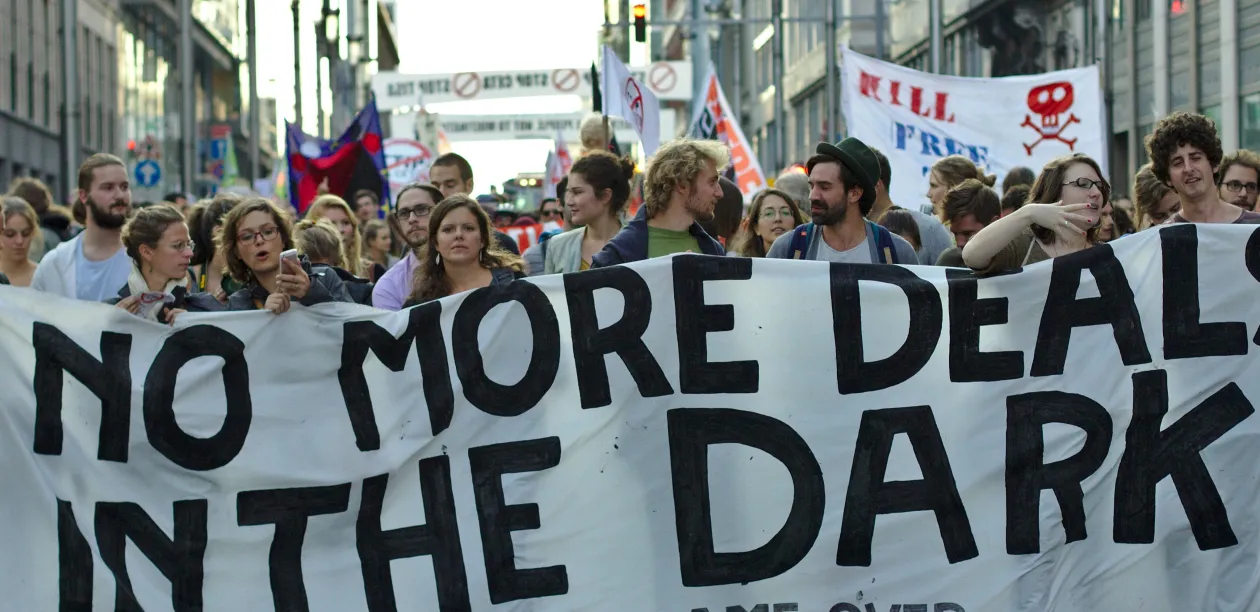What is TTIP?

The intention to launch TTIP negotiations was first announced by President Barack Obama in his State of the Union address in February 2013, and the first round of negotiations took place between European Commission and US officials in July of the same year. The aim was to rush through the talks as swiftly as possible with no details entering the public domain, in the hope that they could be concluded before the peoples of Europe and the USA find out the true scale of the TTIP threat.
The stakes, in other words, could not have been higher.
There was a huge body of concern among EU and US citizens at the threats posed by TTIP, and civil society groups joined forces with academics, parliamentarians and others to prevent pro-business government officials from signing away the key social and environmental standards listed above.
TTIP was projected to cost at least 1 million jobs, undermine our most treasured public services, lead to a ‘race to the bottom’ in food, environmental and labour standards and, for the first time, allow US companies to sue the UK government in special courts.
TTIP was marketed as the answer to recession in Europe and the USA, with bogus promises of growth and jobs. Yet the official study commissioned at the start of the talks calculated that at least 1 million people would lose their jobs in the EU and USA as a direct result of TTIP. With unemployment already at record levels in much of Europe, these people would have found it impossible to get new jobs.
TTIP was not just about the EU and USA. Negotiators said that TTIP would set the standard for all future trade and investment rules across the world. This means that TTIP would have enshrine the rights of transnational corporations over and above the needs of people and the planet, forever.
The three pillars of TTIP
Deregulation
As officials from both sides acknowledged, the primary aim of TTIP was not to stimulate trade through removing tariffs between the EU and USA, as these are already at minimal levels. The main goal of TTIP was, by their own admission, to remove regulatory ‘barriers’ which restrict the potential profits to be made by transnational corporations on both sides of the Atlantic.
Yet these ‘barriers’ are in reality some of our most prized social standards and environmental regulations, such as labour rights, food safety rules (including restrictions on GMOs), regulations on the use of toxic chemicals, digital privacy laws and even new banking safeguards introduced to prevent a repeat of the 2008 financial crisis.
Privatisation
TTIP sought to create new markets and boost corporate profits by opening up public services and government procurement contracts to competition from transnational corporations, threatening to introduce a further wave of privatisation in key sectors, such as health and education, and ‘lock in’ privatisations that have already happened.
Companies such as Virgin are already running front line health care services as a result of the Health and Social Care Act 2012. Health services are included in TTIP and NHS privatisation will be irreversible if the deal goes through. The same holds true for education, water and environmental services, as well as for any hope of renationalising the railways. Under TTIP, privatisation is for ever.
Corporate courts
Most worrying of all, TTIP sought to grant foreign investors a new right to sue sovereign governments in front of ad hoc arbitration tribunals for loss of profits resulting from public policy decisions.
This ‘investor-State dispute settlement’ (ISDS) mechanism effectively elevates transnational capital to a status equivalent to the nation-state itself. TTIP was therefore correctly understood not as a negotiation between two competing trading partners, but as an attempt by transnational corporations to prise open and deregulate markets on both sides of the Atlantic.
ISDS threatens to undermine the most basic principles of democracy, as previous cases from other treaties show:
- Dutch firm Achmea successfully sued the new government of Slovakia for reversing an unpopular health privatisation.
- Canadian company TransCanada is suing the USA for $15 billion for stopping a tar sands pipeline in the name of climate change
- Swedish company Vattenfall is suing the German government for €5 billion over its decision to phase out nuclear power by 2022.
- Veolia is suing the Egyptian government for loss of profits as a result of the country’s decision to raise the minimum wage.
- US company Lone Pine is suing Canada for the ban on fracking in Quebec.
Food and TTIP
Big business sees EU food standards - crafted to protect public health and the environment - as “barriers to profit”. A host of US corporations and associations are pushing hard for EU standards to align with low US standards under a deregulation agenda.
The EU differs from the USA in its adherence to the “farm-to-fork” approach and use of the “precautionary principle”. The farm-to-fork approach ensures that hygiene is prioritised at every step of the food production process. The precautionary principle means that before a product or new process is released onto the market, companies must prove that it poses no risk to public health or the environment; in the absence of which the precaution will be taken to prohibit the product/process.
The USA adopts an opposite approach. It evaluates profit alongside health and environmental concerns; with pesticides, if a product is more profitable, the required standard for health and environmental impacts is lower. In meat production, meat is bathed in harsh chemicals before being sold, as opposed to ensuring hygiene at every step of the production process. New products or processes do not need to go through rigorous testing prior to being commercialised as they are presumed safe. The burden of proof instead falls upon the government, funded by taxpayers.
The European Commission (EC) says TTIP will not be used to lower our food safety standards. However, the EC is applying for the second time - after a failed attempt in 2008 - for acid-washed chicken to be permitted into the EU. In 2013 new legislation opened the door to beef washed in lactic acid, despite concerns about carcinogenic effects.
Our demand: food sovereignty
Food sovereignty is the approach championed by War on Want and its partner organisations, and demanded by more than 200 million farming and fishing families worldwide.
Food concerns us all. We are all eaters, whether we grow, produce, harvest food, or buy food! Decisions around food impact on public health, animal welfare, the environment, the economy (individual, local, and global), but also on our social cohesion, wellbeing and culture.
Food sovereignty is rooted in our right to food and to reclaim control over our food system: to have the power to decide what we eat, where it is produced by whom and how, and to be able to pay a just price for it. At its heart lie key universal principles: food for people (rather than profit); valuing food providers; local decision-making; building knowledge and skills; working with nature.
TTIP proposes at its core to deeply entrench and lock our food system into further corporate control.



